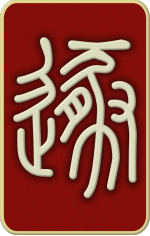
遁 Dùn Withdrawal (Retreat) [hexagram 33]


Heaven over Mountain
 Metal element
Metal element
Lunar month: 6 ; Host (controlling) line : 2
The Decision
Withdrawal brings successful progress; there is small reward for persistence.
‘Withdrawal brings successful progress’ – denotes limited progress. The strong is the superior place and is properly responded to. Action takes place at the appropriate time. ‘There is small reward for persistence’ – small things advance and then grow. Withdrawal at the appropriate time is most important.
遁: 亨, 小利贞. Dùn: hēng, xiǎo lì zhēn.
彖傳: 遁亨, 遁而亨也. 刚当位而应, 与时行也. 小利贞, 浸而长也. 遁之时义大矣哉! Tuàn zhuàn: Dùn hēng, dùn ér hēng yě. gāng dāng wèi ér yīng, yǔ shí xíng yě. xiǎo lì zhēn, jìn ér cháng yě. dùn zhī shí yì dà yǐ zāi!
The Image
Heaven above mountain denotes ‘Withdrawal’. The wise keep distance from the common people, not that there is ill-will but appropriate reserve.
象传: 天下有山, 遁; 君子以远小人, 不恶而严. Xiàng zhuàn: Tiān xià yǒu shān, dùn; jūn zǐ yǐ yuǎn xiǎo rén, bù wù ér yán.
Line Change 1
The tail withdraws – peril. Nothing should be undertaken.
Peril is shown by the withdrawing tail but if stay still what can go wrong?
初六: 遁尾, 厉, 勿用有攸往. Chū liù: dùn wěi, lì, wù yòng yǒu yōu wǎng.
象传: 遁尾之厉, 不往何灾也. Xiàng zhuàn: Dùn wěi zhī lì, bù wǎng hé zāi yě.
Line Change 2
Holding on tightly with a golden leather strap – a hold that cannot be broken.
‘Holding on tightly with a golden leather strap’ – a strong grip on intentions.
六二: 执之用黄牛之革, 莫之胜说. Liù èr: zhí zhī yòng huáng niú zhī gé, mò zhī shèng shuō.
象传: 执用黄牛, 固志也. Xiàng zhuàn: Zhí yòng huáng niú, gù zhì yě.
Line Change 3
Retreat but in shackles – distress and danger. Providing for one’s people would bring good fortune.
The danger from ‘Withdrawing but in shackles’ is due to exhaustion. ‘Providing for one’s people would bring good fortune’ – however this is not suitable for critical affairs.
九三: 系遁, 有疾厉, 畜臣妾吉. Jiǔ sān: xì dùn, yǒu jí lì, xù chén qiè jí.
象传: 系遁之厉, 有疾惫也. 畜臣妾吉, 不可大事也. Xiàng zhuàn: Xì dùn zhī lì, yǒu jí bèi yě. xù chén qiè jí, bù kě dà shì yě.
Line Change 4
Withdrawing under duress; for the wise this will bring good fortune but lesser people cannot prosper by it.
The wise withdraw under duress – but lesser people will not countenance it.
九四 : 好遁, 君子吉, 小人否. Jiǔ sì: hào dùn, jūn zǐ jí, xiǎo rén fǒu.
象传: 君子好遁, 小人否也. Xiàng zhuàn: Jūn zǐ hào dùn, xiǎo rén fǒu yě.
Line Change 5
Admirable retreat. If steadfast the future is promising.
‘Admirable retreat. If steadfast the future is promising’ – holding firm to objectives.
九五: 嘉遁, 贞吉. Jiǔ wǔ: jiā dùn, zhēn jí.
象传: 嘉遁贞吉, 以正志也. Xiàng zhuàn: Jiā dùn zhēn jí, yǐ zhèng zhì yě.
Line Change 6
Cheerfully withdrawing. Everything is favorable.
‘Cheerfully withdrawing. Everything is favorable’ – no doubts about the true course.
上九: 肥遁, 无不利. Shàng jiǔ: féi dùn, wú bù lì.
象传: 肥遁, 无不利; 无所疑也. Xiàng zhuàn: Féi dùn, wú bù lì; wú suǒ yí yě.
The full set of 64 English translations is available in our new book 'Book of Changes - Deciphered' ➚.